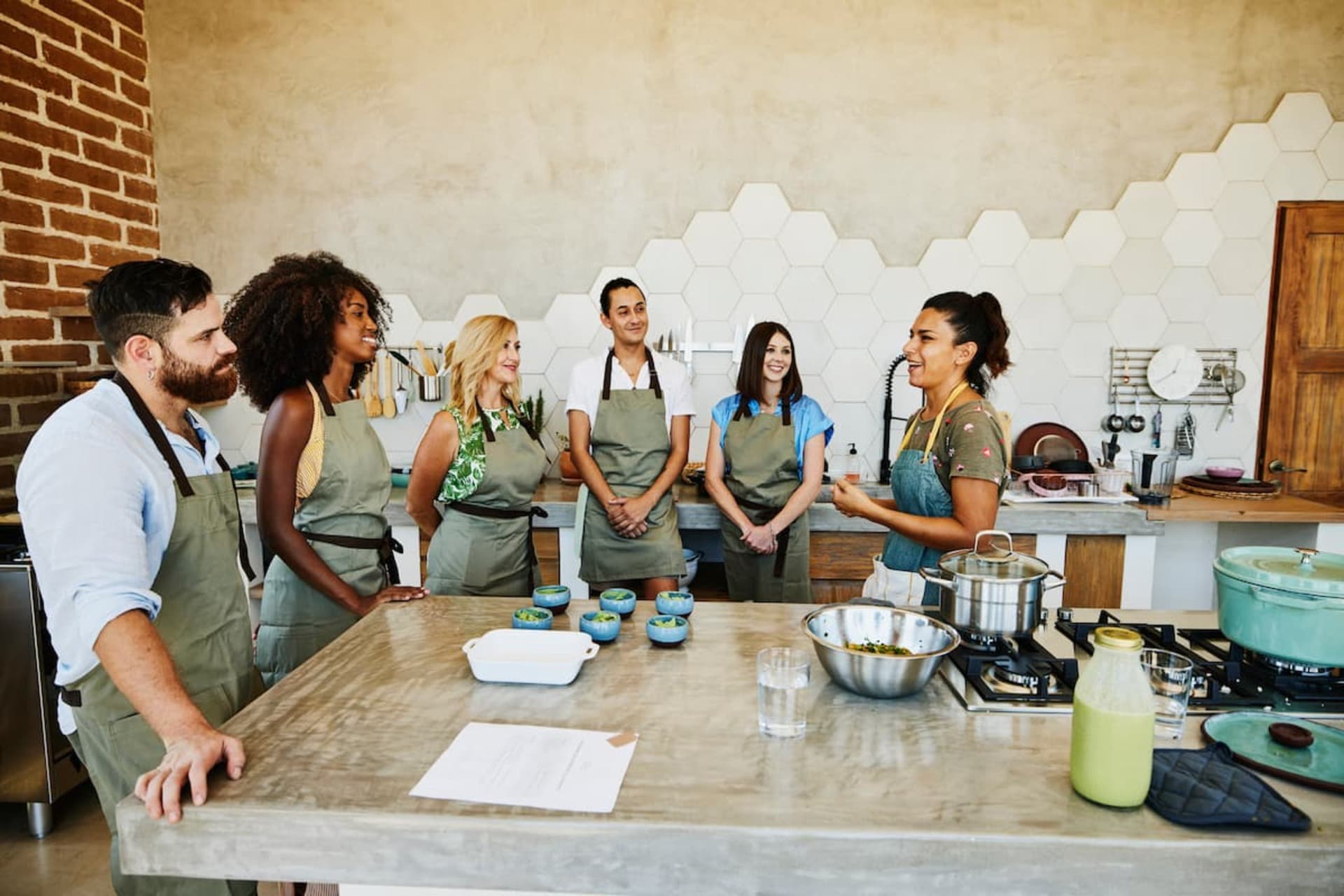What do food consulting companies do?

The food industry can be highly competitive, with almost 800,000 restaurants in the US alone, and they, along with bars, manufacturers and food vans, all need help sometimes. Food consulting companies provide strategic guidance, operational expertise and creative solutions tailored to meet the unique challenges and opportunities faced by their clients.
Join us as we explore the roles and services of these companies, highlighting how they contribute to success and innovation in the exciting food and beverage sector. Whether refining menu design, optimizing operations or developing marketing strategies, consultants are vital in shaping culinary excellence and securing business success.
Comprehensive services offered by top food consulting firms
Culinary consultancy businesses combine industry expertise with innovative strategies to deliver measurable results and support business growth. Below, we’ll look at some of the key services typically offered by leading firms.
Strategic business planning
Food consulting firms assist clients in developing business plans that outline goals, objectives and actionable steps to achieve long-term success. This includes conducting market research, assessing competitive prospects and identifying growth opportunities to build tailored strategies that align with customers’ visions and aims.
Menu engineering and development
These services focus on optimizing menus to boost profitability, appeal to target demographics and reflect culinary trends. Consultants collaborate with chefs and restaurant owners to design well-balanced menus that maximize revenue through strategic pricing, portion control and menu layout optimization.
Operational improvement and efficiency
Consultants also have to analyze and streamline business processes to improve efficiency, reduce costs and boost overall performance. They conduct operational audits, identify bottlenecks and implement process improvements in areas such as kitchen operations, inventory management, staff training and workflow.
Marketing and brand strategy
Advertising is essential to boost brand awareness, attract new customers and build customer loyalty. Consultants create integrated marketing campaigns, manage digital and social media presence and implement targeted advertising strategies to effectively communicate clients' unique value propositions in their target markets.
Financial management and profitability analysis
Consultants provide expertise in financial planning, budgeting, cost analysis and profit optimization. They conduct economic assessments, evaluate pricing strategies, manage cash flow and give insights to improve financial performance and sustainability. This all helps clients make informed decisions to achieve monetary goals and navigate economic challenges.
Quality assurance and food safety compliance
It is important to ensure compliance with regulatory standards and uphold food safety protocols. This includes maintaining high quality levels in production, handling and service. Consultants conduct food safety audits, implement quality control measures, provide training in hygiene practices and assist in obtaining certifications to mitigate risks and safeguard public health.
Hospitality and customer experience enhancement
Food and beverage services are a major part of many hospitality businesses. Here, consultants focus on boosting guest satisfaction and improving overall customer experience in restaurants, hotels and resorts. They define service standards, train staff on hospitality best practices, implement client feedback systems and create personalized experiences to boost loyalty and drive repeat business.
Integration of sustainability and ethical practices
Becoming more important in food consulting, sustainability reflects consumer preferences for environmentally and socially conscious businesses. Professionals advise on good sourcing practices, waste reduction initiatives and ethical supply chain management to support clients in meeting corporate social responsibility goals and raising brand reputation. They help clients with organic, fair trade and responsible sourcing certifications to align their businesses with evolving customer expectations and regulatory standards.
Innovation and adaptation to industry trends
Key to food consulting, innovation drives continuous improvement and helps businesses adapt. This aspect of the role is all about collaborating with clients to change product offerings, developing unique dining concepts and implementing technological advancements that optimize operational efficiency and customer satisfaction. Consultants encourage a culture of invention in food businesses, encouraging experimentation and adaptation to evolving consumer preferences and market changes.

The intersection of science, creativity and business in food consulting
Working to support food businesses isn’t just a creative task; it involves a mix of technology, culinary creativity and strategic business acumen. These elements are key to addressing the wide range of challenges and opportunities faced by food businesses.
Scientific expertise in food technology
At the core of food consulting lie developments in food technology and innovation. Advisors with backgrounds in food science, nutrition and food engineering apply their knowledge to create new products, speed up manufacturing processes and improve food safety standards. They use cutting-edge research and technology to create healthier, more sustainable and commercially viable goods that meet consumer demands and regulatory requirements.
Culinary creativity and menu development
Another essential component of food consulting is chefs and cookery experts working with clients to craft innovative menus and recipes. These professionals blend culinary traditions with contemporary trends, emphasizing flavor profiles, ingredient sourcing and aesthetic presentation to create memorable dining experiences. Consultants can also help with restaurant layout and decor to help keep a creative theme going.
Strategic business acumen and market insight
Business know-how is also vital for helping clients navigate competitive spaces and capitalize on emerging trends. Consultants conduct market research, analyze consumer behavior and identify opportunities to develop tailored strategies that drive business growth and improve market positioning. They help with brand development, marketing campaigns and operational efficiency improvements to achieve sustainable profitability and maintain competitive advantage. All of this can be a huge help for people who have based their food business purely on creativity and may be lacking business knowledge.
How to start as a food consultant
Becoming a food and beverage advisor involves developing your expertise, gaining practical experience and establishing credibility in the industry. Whether you're a seasoned chef looking to move into consulting or a recent graduate with a passion for culinary innovation, a great career can be made in guiding businesses to success. Below, we’ll look at some of the essential steps you’ll need to take to kickstart your development.
Evaluate your skills and expertise
Assess your culinary proficiencies, industry knowledge and areas of specialization that can add value to food businesses. Identify your strengths, whether in menu development, operational efficiency, safety, marketing or sustainability. Highlighting your unique skills will help define your consulting niche and attract potential clients.
Gain professional experience
Get hands-on practice in various facets of the food and beverage industry to build credibility as a consultant. Work in restaurants, catering companies, food manufacturing facilities or hospitality venues to understand operations, challenges and best practices. Alternatively, look for internships for management practice. Real-world experience will boost your knowledge of client needs and enable you to offer valuable insights as a consultant.
Get relevant education and certifications
While formal education isn't always required, specialized training can massively improve your credentials as a food consultant. Consider pursuing courses in food safety, hospitality management, culinary arts or business administration to strengthen your expertise. A food arts degree with business modules will introduce you to all the ins and outs of running food businesses.
Define your consulting niche
Identify your target market and specialism based on your skills, interests and market demand. Determine whether you concentrate on menu development, operational improvement, marketing strategy, sustainability practices or another discipline. Focusing on a specific area allows you to differentiate yourself from competitors and tailor your services to meet distinct client needs effectively.
Build your professional network
Connecting with others is essential for establishing yourself as a food consultant. Attend industry events, culinary trade shows and gatherings to network with potential clients, industry professionals and fellow advisors. Join professional associations or local restaurant groups to expand your contacts and stay up to date with industry trends.
Create a business plan
If you are considering starting on your own, develop a comprehensive business strategy outlining your services, target clients, pricing structure, marketing strategies and financial projections. Lay out your value proposition, competitive advantages and short-term and long-term goals. A well-defined business plan serves as a roadmap for launching and growing your consulting practice.
Market your services
Promote your consulting services through a professional website, social media platforms and networking channels. Showcase your expertise through case studies, client testimonials and examples of successful projects. Use digital strategies, such as content marketing and email campaigns, to reach potential clients and establish yourself as a leading figure in your niche.
Provide exceptional service and build client relationships
Deliver high value to your clients by offering practical solutions, personalized recommendations and measurable results. Prioritize customer satisfaction and build strong relationships based on trust, integrity and reliability. Positive reviews and referrals are invaluable for growing your reputation and expanding your consulting business.
What it's like to work in food consulting companies
Guiding food businesses to success offers an exciting career that blends food expertise with strategic business acumen. If you choose to go down this route, you can expect:
-
Collaborative environment: food consulting firms encourage teamwork among experts from culinary arts, food science, marketing, finance and sustainability. This multidisciplinary approach encourages creativity, knowledge sharing and innovative problem solving
-
Client-centric impact: consultants directly influence clients' success by providing tailored solutions in menu development, operational improvements and marketing strategies. This client-focused role offers tangible outcomes and opportunities to see how your recommendations drive business growth
-
Fast-paced projects: the industry's nature means consultants handle multiple projects simultaneously, from market research and analysis to solution implementation. This challenges them to adapt quickly, building their skills and expertise
-
Continuous learning: training programs, industry conferences and workshops are encouraged. Staying up to date with trends and regulations ensures consultants remain at the forefront of industry innovation and best practices and therefore able to recommend the most effective solutions to their clients
-
Rewarding relationships: building strong bonds with clients is central to success in food consulting. You can get satisfaction from making a meaningful impact on clients' operations and profitability, growing long-term partnerships and boosting job satisfaction
-
Challenges and growth opportunities: while managing tight deadlines and varied client needs presents challenges, it also fuels growth, innovation and professional development. This helps develop resilience and problem-solving skills that strengthen your chances for career advancement
Conclusion
Food consulting companies play a vital role in the food and beverage industry by offering specialized expertise, strategic insights and innovative solutions to address a wide range of challenges faced by businesses. From improving operational efficiency and developing creative menu concepts to understanding regulatory compliance and building marketing plans, these firms help gastronomic companies thrive in a competitive market environment.
This makes for an exciting and varied career for people who have an interest in the culinary arts and business. If you think this could be the right path for you, see how a degree from a renowned French culinary institute could help.


